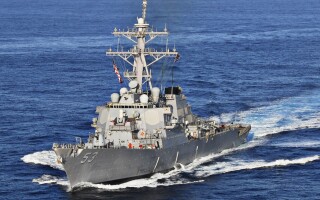U.S. Navy: Torpedo defense capability for LCS fleet completes testing
NewsMay 09, 2018
WASHINGTON. Officials from the Littoral Combat Ship (LCS) Mission Modules (MM) program announced the completion of a two-day at-sea testing of the LCS's AN/SLQ-61 Lightweight Tow (LWT) Torpedo Defense Mission Module (TDMM).
The LWT is a modular, digitally controlled soft kill countermeasure decoy system. It employs an underwater acoustic projector deployed from the ship's stern on a tow cable to defend ships against wake-homing, acoustic homing, and wire-guided enemy torpedoes. The LWT system is significantly lighter in weight than the current AN/SLQ-25 system used in the fleet -- also known as Nixie -- and has a different tow profile, making it suited for small combatant warships operating in littoral environments, officials explain.
"This test was highly successful and demonstrated that this technology, which provides critical torpedo defense capability for the LCS class of ships, is ready for integration aboard an LCS," says Capt. Theodore Zobel, LCS Mission Modules program manager.

The test event was the final at-sea test on a commercial vessel. The program is incorporating lessons learned from this event as it prepares for TDMM integration and formal developmental and operational tests aboard an LCS. The torpedo defense capability the TDMM provides is envisioned for eventual deployment on all LCS ships, and potentially other small combatants.
Program Executive Office Unmanned and Small Combatants (PEO USC) provides a single program executive responsible for acquiring and sustaining the littoral combat ship class and mission capabilities; the future frigate; the multi-mission surface combatant - an LCS variant for international customers; mine, anti-submarine and surface warfare systems; and unmanned maritime systems. With responsibility for accelerating, innovating, and delivering a lethal force to meet the Navy's growing operational demands, PEO USC is ideally positioned to play a critical role in the department's drive to boost innovation and increase the pace of technological change in the fleet.








